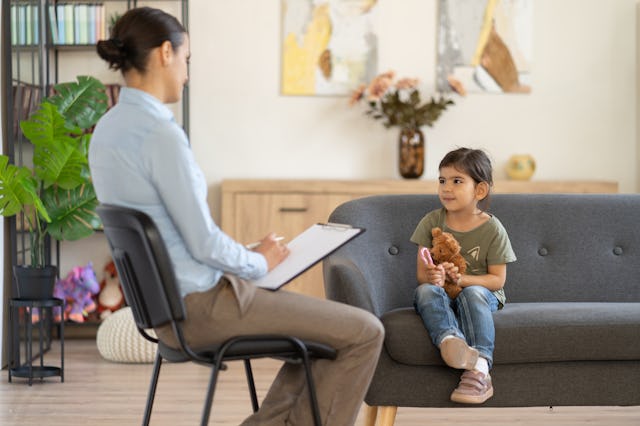A Utah Bill Would Limit What Children Could Talk About In Therapy
Mental health organizations have opposed HB-281, which they say could enable child abuse.

Therapy is widely regarded as a safe space for anyone, including children, to talk about their biggest worries, problems, and traumas. But in Utah, House Bill 281, a bill giving parents the authority to block certain topics of discussion in school therapy sessions, might make opening up harder. More troublingly, says the Utah Association for Marriage and Family Therapy, it might make it difficult to discover abuse. On February 11, HB218 overwhelmingly passed in the House of Representatives in a 48 to 19 vote, with five Republicans joining all of the legislature’s Democrats in opposition.
In Utah, students already must have parental consent in order to receive therapy in a school setting. HB218 expands parental involvement by giving them “the opportunity to identify topics or issues the parent intends a school-based mental health therapist to address or not address.” Moreover, parents must obtain notification within one business day that a therapy session took place and a description of what was discussed.
“A school-based mental health therapist may not address a topic or issue for which a parent has expressly stated an intent for the therapist to not address with the student,” the bill reads. While there is an exception carved out if a student shares imminent danger, such as abuse or thoughts of suicide, it can be difficult to get a child to express those issues if a counselor is not allowed to bring up topics or ask questions that might help them express the problem.
“If a parent says that we cannot talk about sex, then how do we assess for sexual abuse?" asked Sarah Stroup with the Utah Association for Marriage and Family Therapy in testimony last month. “In reality, we are potentially increasing risk and harm to children in this area. We are potentially protecting perpetrators. One in 10 children will be sexually abused in their lifetime, and of those cases, 90% will be by a known and trusted adult.”
Stroup noted that spontaneous disclosure of abuse from children is rare — often they lack the language to even express what’s happened — making it all the more important for counselors and therapists to be able to ask direct questions.
Other mental health organizations, including the Utah chapter of the National Association of Social Workers, and the Utah Mental Health Counselors Association, as well as clinicians in private practice, all oppose the bill on similar grounds.
The bill seeks to increase “parental rights,” which has become a rallying cry among those who seek increased control over their children’s lives outside of the walls of their home. Utah Parents United, for example, praises HB281 as “creat[ing] clear safeguards to ensure that parents have full control over their child’s therapy in schools.”
But removing any and all third parties from children’s lives also removes safeguards against abuse and problems at home.
The bill will move on to the Utah senate. With a Republican super-majority and a Republican governor, HB-281 has a clear path to victory.
CORRECTION: An earlier version of this article did not make clear that Democrats and five Republicans voted in opposition to the bill.